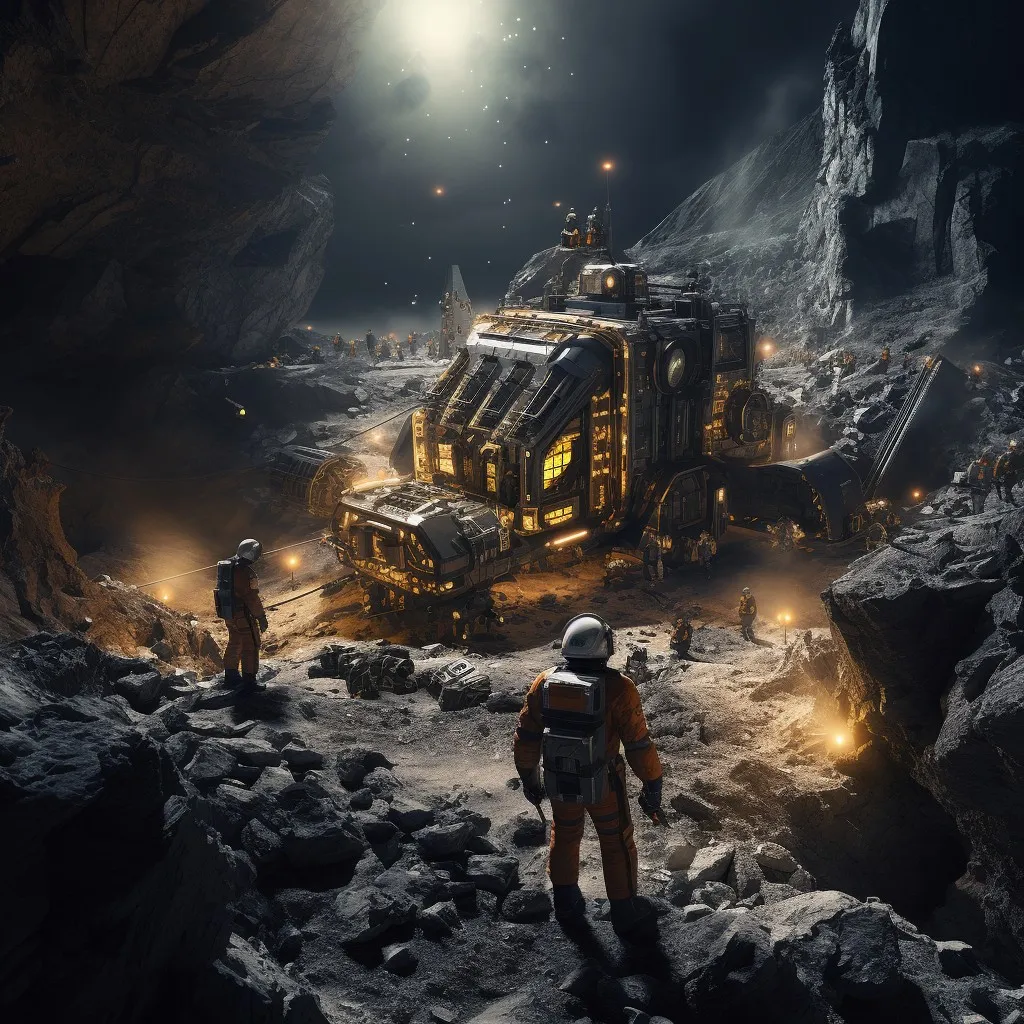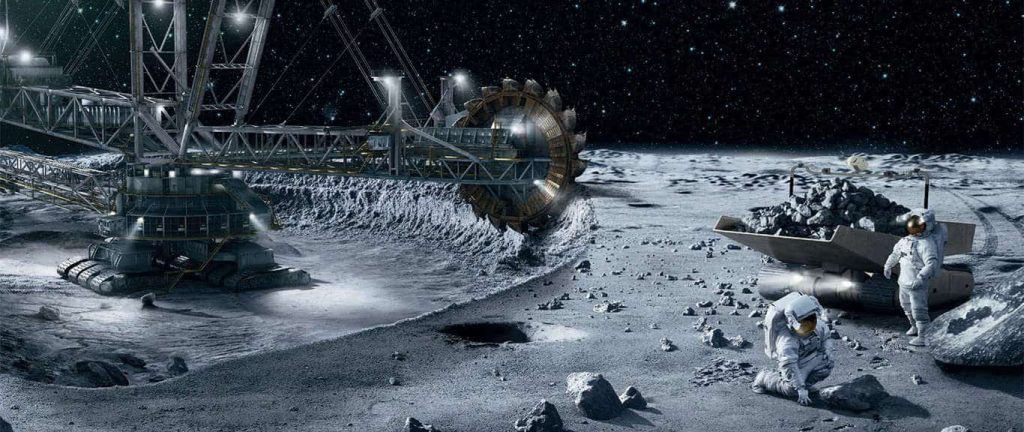Table of Contents
Space mining, the extraction of valuable minerals and resources from asteroids, planets, and other celestial bodies, represents a new frontier in human exploration and industry. As technological advancements make space more accessible and economically viable, space mining promises to revolutionize resource acquisition, potentially transforming economies and industries on Earth and beyond. This article explores the concept of space mining, its potential benefits, current developments, and the challenges facing this ambitious endeavor.

1. What is Space Mining?
Space mining involves the extraction of minerals, metals, and other valuable resources from celestial bodies such as asteroids, moons, and planets. Unlike traditional mining on Earth, space mining aims to tap into extraterrestrial resources that are abundant and often contain high concentrations of precious materials.
- Types of Resources: Space mining targets a variety of resources, including precious metals like platinum and gold, rare earth elements essential for advanced technologies, and water, which can be used for life support and fuel production in space.
- Extraction Methods: Several methods are being considered for space mining, including robotic mining operations, asteroid capture and processing, and in-situ resource utilization (ISRU), where resources are extracted and used directly on the celestial body.
Space mining represents a cutting-edge approach to resource extraction, harnessing the vast potential of the cosmos to meet growing demands on Earth.
2. Potential Benefits of Space Mining
Space mining offers several potential benefits that could significantly impact both Earth and space exploration:
- Resource Abundance: Asteroids and other celestial bodies are believed to contain vast quantities of valuable materials. For example, some asteroids are estimated to contain more platinum than has ever been mined on Earth. Accessing these resources could alleviate scarcity and reduce dependency on terrestrial mining.
- Economic Growth: The development of space mining could spur economic growth by creating new industries and job opportunities. Investments in space mining technology, infrastructure, and research could lead to significant advancements and innovations.
- Supporting Space Exploration: Space mining can support long-term space exploration and colonization efforts by providing essential resources such as water, which can be converted into oxygen and hydrogen for life support and rocket fuel. This capability could make deep space missions and the establishment of extraterrestrial bases more feasible.
- Environmental Impact: By reducing the need for terrestrial mining, space mining could lessen the environmental impact of mining operations on Earth. Extracting resources from space may help preserve terrestrial ecosystems and reduce pollution associated with traditional mining practices.
The potential benefits of space mining extend beyond resource acquisition, offering opportunities for economic growth, environmental preservation, and advancements in space exploration.

3. Current Developments in Space Mining
Several initiatives and projects are advancing the field of space mining:
- Asteroid Mining Companies: Companies like Planetary Resources and Deep Space Industries have been at the forefront of developing technologies for asteroid mining. These companies are working on spacecraft designs, mining techniques, and resource processing methods to make space mining a reality.
- Government Programs: Space agencies such as NASA and the European Space Agency (ESA) are exploring the potential of space mining through research and collaboration with private companies. NASA&8217;s OSIRIS-REx mission, for example, aims to collect samples from the asteroid Bennu and return them to Earth for analysis.
- International Treaties: The legal framework for space mining is evolving, with international agreements such as the Outer Space Treaty and the Moon Agreement addressing issues related to space resource utilization. The development of clear and fair regulations is crucial for ensuring that space mining activities are conducted responsibly and equitably.
Current developments in space mining highlight the growing interest and investment in this field, as well as the collaborative efforts needed to advance technology and establish a legal framework.
4. Challenges and Risks
Space mining faces several challenges and risks that must be addressed for its successful implementation:
- Technical Challenges: Extracting resources from space involves complex engineering and technology challenges, including developing spacecraft capable of landing on and mining asteroids, handling extreme temperatures and radiation, and processing resources in space environments.
- Economic Viability: The high costs associated with space missions and mining operations pose a significant challenge. Ensuring the economic viability of space mining requires advancements in technology to reduce costs, as well as the development of commercial models that can sustain operations.
- Legal and Regulatory Issues: The legal and regulatory framework for space mining is still evolving. Issues related to property rights, resource ownership, and environmental protection must be addressed to create a fair and transparent system for managing space resources.
- Environmental Concerns: While space mining could reduce the environmental impact of terrestrial mining, it is important to consider the potential impact on celestial bodies and space environments. Responsible practices and mitigation strategies are necessary to prevent contamination and preserve the integrity of space ecosystems.
Addressing these challenges and risks requires collaborative efforts between governments, private companies, and international organizations to develop solutions and establish guidelines for space mining.
5. The Future of Space Mining
The future of space mining holds exciting possibilities:
- Technological Advancements: Continued advancements in robotics, artificial intelligence, and space technology will drive the development of efficient and cost-effective space mining operations. Innovations in these fields will make space mining more feasible and sustainable.
- Expansion of Mining Operations: As technology progresses and commercial viability improves, space mining operations are expected to expand to a wider range of celestial bodies. This expansion could include mining the Moon, Mars, and other planets, in addition to asteroids.
- Global Collaboration: The success of space mining will depend on global collaboration and the establishment of international agreements. Cooperation between countries, private companies, and research institutions will be essential for advancing space mining and ensuring that it is conducted responsibly and equitably.
- Economic Impact: Space mining has the potential to significantly impact global economies by creating new industries, reducing resource scarcity, and supporting space exploration. The development of space mining could lead to a new era of economic growth and technological advancement.
The future of space mining promises to be transformative, offering opportunities for exploration, resource acquisition, and economic development.

Conclusion
Space mining represents a bold and innovative approach to resource extraction, with the potential to revolutionize industries and economies on Earth and beyond. With benefits such as resource abundance, economic growth, and support for space exploration, space mining offers exciting possibilities for the future. However, the field also faces challenges related to technology, economics, legal frameworks, and environmental concerns. By addressing these challenges and advancing technology, space mining could become a key component of humanity&8217;s journey into space, opening new frontiers for exploration and resource utilization. As we look to the future, space mining stands at the forefront of a new era of discovery and opportunity, offering the promise of transforming our understanding of the cosmos and our place within it.
